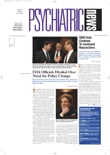Some seven years before the anticipated publication of DSM-V, APA's 2005 annual meeting will feature numerous sessions designed to inform members of research-related activities now under way that will support the next revision of the diagnostic manual, according to Darrel A. Regier, M.D., M.P.H, director of APA's Division of Research and executive director of the American Psychiatric Institute for Research and Education (APIRE).
“The unprecedented 18-year hiatus between the publication of DSM-IV in 1994 and of DSM-V, now slated for 2012, has been marked by extraordinary progress in research on the brain and mental disorders,” Regier noted. The designation of the 1990s as the Decade of the Brain, greater sophistication in mental health epidemiology, the decoding of the human genome, the doubling of the NIH budget, and new demands exerted on classification systems by the evolving health care environment have helped generate a wealth of information and data that can enhance psychiatric diagnoses, he added.
“With the involvement of APA members and scientists throughout the world, we have ample lead time prior to the official revision process to assess what we know in key diagnostic areas, to identify problems with the current classification, and to recommend and even conduct needed research,” stated William Narrow, M.D., M.P.H., associate director for diagnosis and classification in the Division of Research.
A forum at noon on Monday, May 23, titled “Research Planning for DSM-V,” will review progress to date on APA's flagship project in this area—a multiyear series of research planning conferences on selected diagnoses. The conferences are cosponsored by APIRE and the World Health Organization with funding from the NIH institutes responsible for research on mental health, drug abuse, and alcohol abuse and alcoholism.
The research reviews and recommendations generated through the conferences will serve as resources for future DSM-V work groups and, at the discretion of the WHO leadership, for the pending ICD-11 revision.
Three conferences have already taken place. The project launch, in February 2004, was devoted largely to a review of cutting-edge statistical methods that will be useful in analyzing new and existing data relevant to nosology and diagnosis. Two recent conferences focused on personality disorders and substance use disorders. At the annual meeting forum, members of the executive steering committee assigned to oversee all aspects of the project will highlight findings and recommendations generated at these conferences and preview diagnostic topics that future conferences will examine.
The symposium titled “Research Agenda for a Dimensional Classification of Personality Disorder” will review the scientific rationale and prospects for integrating alternative dimensional models into currently used categorical approaches to the diagnosis of personality disorders. The symposium will be chaired by John Livesley, Ph.D., and co-chaired by Thomas Widiger, Ph.D., who also co-chaired the research planning conference on personality disorders, and will be held on Thursday, May 26, at 2 p.m.
“We are tremendously gratified by the extent of international interest in the DSM-V research-planning conferences. Because the DSM is used throughout the world, we are making a strenuous effort to ensure that the definitions and criteria for disorders reflect the science base and are relevant to the different ways in which individuals experience mental disorders across the globe,” Regier said.
Each APA/WHO/NIH conference is being co-chaired by a senior U.S. investigator and an international colleague, and psychiatrists and others from around the world are being invited to participate. Half the conferences will meet in international venues; a conference on dementia, for example, will be held in conjunction with the World Congress of Psychiatry that meets in Cairo in September.
Other DSM sessions at the Atlanta meeting will include two symposia and an issue workshop that will present the results of exhaustive reviews, conducted under APA/APIRE auspices, of recent diagnosis-relevant research in three areas: late-life mental disorders, directed by Dilip Jeste, M.D.; sex/gender issues in the diagnostic process, directed by Katharine Phillips, M.D.; and diagnostic issues for infancy and early childhood, led by Irene Chatoor, M.D.
“In fields as vibrant and diverse as those that collectively contribute the scientific base for our classification and diagnostic systems,” Regier said, “incremental advances are being made every day in research settings around the world. Only when we step back and take a focused look, through the lens of nosology, at progress in areas ranging from neuroimaging to genetics to psychometrics and many other fields do we appreciate the richness of our research base and its implications for diagnosis.”
He added that APIRE already has created a means of keeping up with the activities that will be reported at the annual meeting.
“Members should be aware that a Web site is available at<www.DSM5.org>, which will be reporting new developments as they occur over the next several years. The creation of this Web site was led by Michael First, M.D., who serves as a consultant to APA and has played a major role in prior revisions of the DSM. This will be an important site for psychiatrists and others who wish to keep apprised of the research planning for the next DSM and who wish to contribute ideas to the process,” Regier said. ▪
